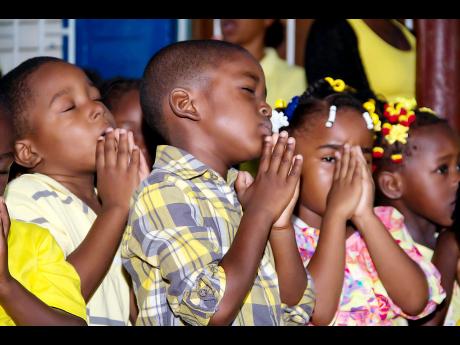Easy as A, BC for infants - Ja, Barbados top 58 regional states in access to early childhood programmes
Jamaica's early childhood programme has been hailed as an example for the region by the Inter-American Development Bank (IDB).
The IDB has also ranked Jamaica and Barbados at the top of 58 low- and middle-income countries in Latin America and the Caribbean with the greatest access to education programmes for infants.
This was highlighted by IDB in a publication released last week titled 'Better Spending for Better Lives: How Latin America and the Caribbean can do more with less'.
The IDB noted that while education access and outcomes is generally far less accessible to disadvantaged groups in the region, this is not the case in Jamaica and Barbados.
"According to data from 58 low- and middle-income countries, 31.4 per cent of all 36-59-month-old children had access to early education programmes, with enrolment rates more than twice as high among children from the top wealth quintile (47.3 per cent) compared with children from the lowest quintile (19.5 per cent)," the report stated.
"Jamaica and Barbados lead the sample with more than 85 per cent of all 36-59-month-old children having access to early education programmes and with enrolment in the lowest quintile almost as high as in the wealthiest quintile," the IDB noted.
Long-term evaluation
The IDB pointed to the fact that Jamaica implemented and conducted the first long-term experimental evaluation of an early childhood development programme in a developing country.
The findings of that study, which saw growth-stunted toddlers receiving psychosocial stimulation, found that Jamaican toddlers reported 25 per cent more earnings as adults.
Director of Sector Support Services at the Early Childhood Commission (ECC), Nordia Seymour-Hall, is not surprised at Jamaica's high ranking for access to these institutions.
"Jamaicans have always placed a lot of emphasis on early childhood education. Jamaican parents think it is very important for the children to start school early, so we have developed that culture in Jamaica where, as soon as the children are three years old, they are registered in a programme and they are attending the programme regularly," said Seymour-Hall.
"Even parents who are unemployed and struggle to pay the fees, they take pride in the fact that the children are at the age where they are starting school, and you dress the child nicely in the brightly coloured uniforms and you walk the child to school and you go back to pick up the child in the afternoon. It is a big part of our culture," added Seymour-Hall.
She noted that in urban and suburban areas, registrations in early childhood institutions start long before the child is three years old, since parents now have a wide range of these institutions to choose from. These include infant schools, basic schools and private kinder preparatory schools.
"We have a lot of early childhood institutions. There is one on every corner," she said.
There are currently more than 2,500 early childhood institutions across Jamaica, and with the fertility rate decreasing in the country, the demand is not great for additional spaces.
"What we have been working on at the ECC is trying to ensure that the quality is consistent and we have seen a lot of improvement in the sector over the years," said Seymour-Hall.
Development plan
The total number of certified early childhood institutions across the island has increased to 128 in recent weeks, and Seymour-Hall said there are ongoing investigations to ensure that the child's development and other needs are being met.
"Most early childhood institutions have a development plan and they are working towards implementing the standards that are required for them to do well, so the system is developing, and I think most persons are becoming aware of the fact early childhood is an important foundation, and if the children are not adequately stimulated in the early years, they will get left behind later on," she said.
State Minister in the Ministry of Education Floyd Green last week argued that while significant strides have been made in getting some early childhood institutions up to par with the ECC operating standards, more needs to be done to get the remaining institutions certified.
"We want to ensure that when they leave our infant schools that they are well equipped for modern-day reality," said Green as he addressed the handover ceremony for the renovated Middlesex Infant School in Holland Bamboo, St Elizabeth.


